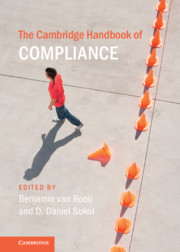Book contents
- The Cambridge Handbook of Compliance
- The Cambridge Handbook of Compliance
- Copyright page
- Contents
- Figures
- Tables
- Contributors
- 1 Introduction: Compliance as the Interaction between Rules and Behavior
- Part I Compliance Concepts and Approaches
- Part II Deterrence and Incapacitation
- Part III Incentives
- Part IV Legitimacy and Social Norms
- Part V Capacity and Opportunity
- Part VI Compliance and Cognition
- Part VII Management and Organizational Processes
- 39 Compliance Management Systems: Do They Make a Difference?
- 40 Business Codes: A Review of the Literature
- 41 Third Party and Appointed Monitorships
- 42 Ethics and Compliance Training
- 43 The Social and Organizational Psychology of Compliance: How Organizational Culture Impacts on (Un)ethical Behavior
- 44 Organizational Factors and Workplace Deviance: Influences of Abusive Supervision, Dysfunctional Employees, and Toxic Work Environments
- 45 Corporate Social Responsibility, ESG, and Compliance
- 46 Agency, Authority, and Compliance
- 47 Life-Course Criminology and Corporate Offending
- Part VIII Measuring and Evaluating Compliance
- Part IX Analysis of Particular Fields
- References
46 - Agency, Authority, and Compliance
from Part VII - Management and Organizational Processes
Published online by Cambridge University Press: 07 May 2021
- The Cambridge Handbook of Compliance
- The Cambridge Handbook of Compliance
- Copyright page
- Contents
- Figures
- Tables
- Contributors
- 1 Introduction: Compliance as the Interaction between Rules and Behavior
- Part I Compliance Concepts and Approaches
- Part II Deterrence and Incapacitation
- Part III Incentives
- Part IV Legitimacy and Social Norms
- Part V Capacity and Opportunity
- Part VI Compliance and Cognition
- Part VII Management and Organizational Processes
- 39 Compliance Management Systems: Do They Make a Difference?
- 40 Business Codes: A Review of the Literature
- 41 Third Party and Appointed Monitorships
- 42 Ethics and Compliance Training
- 43 The Social and Organizational Psychology of Compliance: How Organizational Culture Impacts on (Un)ethical Behavior
- 44 Organizational Factors and Workplace Deviance: Influences of Abusive Supervision, Dysfunctional Employees, and Toxic Work Environments
- 45 Corporate Social Responsibility, ESG, and Compliance
- 46 Agency, Authority, and Compliance
- 47 Life-Course Criminology and Corporate Offending
- Part VIII Measuring and Evaluating Compliance
- Part IX Analysis of Particular Fields
- References
Summary
Abstract: Compliance can and often does serve as a conduit through which regulators and enforcement authorities enlarge their authority beyond statutory bounds. The potential to do so is a function of the symbiotic relationship between compliance officers and regulatory authorities. Compliance officers owe their professional existence and their organizational authority to the interventions of regulators and enforcement agents. This creates a unique incentive structure and renders compliance officers especially receptive to regulators’ extralegal pronouncements. As a result, the separation of compliance from legal and the elevation of the compliance function as the coequal of the legal department, a structure often insisted upon by regulators and enforcement authorities, effectively enlarges the compliance conduit through which the government may abuse the rule of law. Rather than separating compliance from legal, compliance should be subordinated to legal so that an officer accountable exclusively to the best interests of the firm is charged with interpreting the law and advising the firm on what the law requires. Only after this determination has been made should compliance officers be charged with the task of executing these decisions. A necessary condition to realigning organizational responsibilities in this way, however, is for the government to stop insisting on the alternative. More broadly, the government should not involve itself in the organizational details of compliance but, rather, should limit itself to making and enforcing the law.
- Type
- Chapter
- Information
- The Cambridge Handbook of Compliance , pp. 673 - 683Publisher: Cambridge University PressPrint publication year: 2021
References
- 1
- Cited by



